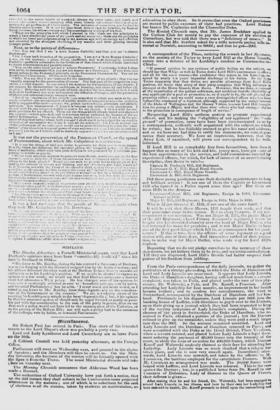A correspondent of the Times, noticing the remark in last
Spectator, on the anxiety of the Tories to keep Lord Hill at the Horse Guards, enters into a defence of his Lordship's conduct as Commander-in- Chief— " If general opinion be any evidence of public feeling on the subject, we should say that Whigs as well as Tories desire Lord Hill's continuance in office ; anti all fur the same reason—the confidence they repose in his Lordship, in.. spired by nearly t..1:1 yeats' impartial discharge of his duties. So far from Tories supposing that they derive any peculiar advantage from Lord Hill's position, we know that many of that party complain that Whig inEuenee is stronger at the Horse Guards than theirs. However, this we deny, convinced of the impartiality of the gallant nobleman, and confident that the eligibility of any applicant for a post or promotion is, as it ought to be, the sole grinuid fin. granting either; and we could name a very distinguished officer who has been refused the command of a regiment, although suppotted by the Ituited interest of the Duke of Wellington and Sir Hussey Vivian, Isreluse Lord Hill thought hitn too young a Major, and that there were others who had stronger to the promotion in consequence of length of service."
Respecting Lord Hill's uniform anxiety to promote experienced officer., and his making the "eligibility of any applicant " the "sole ground" of promotion, some facts have been communicated to us by a correspondent, evidently well acquainted with the subject on which he writes ; but be has foolishly omitted to give his name and address; and as we have not had time to verify his statements, we cannot gua- rantee their accuracy. We have an impression, however, that the Army List, if examined, will prove our cortespondent to be well- informed.
If Lord Hill is so remarkably free from favouritism, how does it happen that so many of his kith turd kin, young !nen, have got some of the best appointments in the service, and bold commisione coveted by experienced officers, but which, for lack of interest of an overwhelming description, they desire in vaiia-
Captain R. Fredetiek Hill, bad Regiment.
Lieutenant G. C. HA Royal Horse Guards, Lieutenant C. Hill, Royal Horse Guards.
Lieutenant A. Hill, Gith Regiment.
Did these young gentlemen owe their desirable appointments to long and brilliant service? Is not one of them the Captain or Lieutenant Hill who figured in a Police report some time ago ? But acre are mote Hills in the Army- Lieutenant-Colonel Hill, bad Regiment; Ensigu in 1619, Lie:amuse- Colonel in 1$16.
3Iajor 1'. Hill, bl.3d Regiment; Ensign in 1811, Major in 1836.
Who is Major- Genteel C. Hill, if not one of the same family ?
It will be edil diet these Messrs. 11ill bought their rank, a:id that their procnotiun came in due course. Not it, every instance, if our Cur. ;'es ponder: t is t:ot mistaken. Was not .Major R. 11 fl I, the juilior Major of the OO I Regiment, ( Lord Fitzroy Somerset's regiment,) sviten be bought the Lieutenant-Colonelcy over the head of Mejor But:sr, who had it nailed his [mine for purchase ; and is not Major Butler to have urns of the first good things which full in, us a recompense for his good- nature ? If this is true, then the officers of sotne regiment ou a good station will, one of these days, find themselves robbed of their promo- tion, to make way fur Major Butler, who made way for Lord Hill's nephew.
Repeating that we do not pledge ourselves to the accuracy of these statements, we yet believe them to be true, and we invite contradiction. Till they are disproved, Lord Hill's friends had better suspend their praises of his freedom from jobbing.


























 Previous page
Previous page